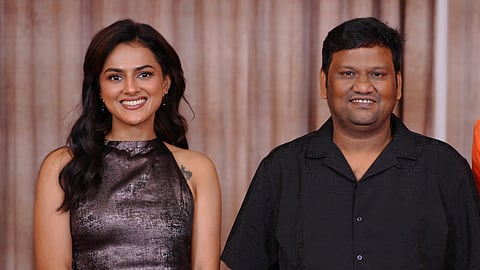

The Game is not just Netflix’s first original Tamil web series. It also marks Shraddha Srinath’s foray into long-format storytelling. The actor says she was ready to do a web series for quite some time, but she was looking for the right project to dive into. Explaining the trace amounts of trepidation that held her back for a few years, Shraddha says, “If you have eight episodes to perform, you have time to enjoy the nuances of the character, which is great for an actor. But then, you are also giving the audience eight episodes to critique you.”
The actor is also conscious of the challenges of holding the audience’s attention at a time of severe attention deficiency. Taking herself as an example, Shraddha says, “I’m very poor at watching shows online. Even if my phone wasn’t buzzing, I would keep checking it for some reason. Then there are shows where you don’t do that. And that is the mark of a well-made show. People have seen me in a feature film format, but I was afraid if I would be able to hold people’s attention in a web series.”
Our attention span is not the only thing altered by the rapid cyberization. With more than half of our waking life spent online, our emotional state and our mental health are also drastically affected by the digital world. The Game explores online bullying and its terrifying real-world implications. Director Rajesh M Selva says, “There are two worlds. The real world and the virtual world. It was interesting to explore how the virtual world affected the emotional state of the characters.”
The Game revolves around Kavya (Shraddha Srinath), a rising star in the world of game developers, who faces an army of trolls after she takes a stance against the widespread misogyny in her field. Rajesh addresses the root of online bullying by pointing out how the increased connectivity has emboldened the bullies. “Just 10 years ago, we couldn’t contact people we didn’t know. Now, anybody can talk to anybody else. In such a world, online trolling amplifies the emotional impact on a person. We look at a toxic mean comment on social media, and we might want to ignore it, but it definitely hurts us and leaves an emotional scar. It affects our various relationships. That is what we try to show with a character like Kavya,” says Rajesh.
Bringing Kavya to life was not the hardest part of the performance for Shraddha, but relating to her was. “I’m not like Kavya, but I find her admirable. The script was very clear. I had Kavya on paper. I just brought her to life. She goes through a traumatic experience, but she comes out of it quickly. Kavya doesn’t wait to get better; she jumps into the issue head-on to fix things. I’m not like that. I need time to collect myself and get up on my feet,” shares Shraddha. But this doesn’t mean that the character is perfect, explains Rajesh. “What I like about the series is that it does not have black and white characters. They are all grey. Even Kavya isn’t completely without fault.”
Some might consider that bullying, online or otherwise, might just be a symptom of a deeper social/psychological issue. In the series, Rajesh delves into the deeper levels of the issue, showing how the hatred that fuels bullying derives its strength from regressive beliefs and world views. This might invoke another criticism that points to how every woman-led film and series pushes its protagonist through some traumatic event so that they can make their social commentaries, however well-meaning they are.
Rajesh says The Game was not written around ‘social commentary checkpoints’ and that it was an organic writing choice. He says, “I don’t see The Game as a women-centric series. We tackled an ongoing real-world issue where the protagonist happens to be a woman. How she handles the effects of online bullying is what the show is all about.” Moreover, the director adds that despite the heavy themes, he made sure to execute the story in a way that is palatable to a wider audience. “We had so many discussions about how to make the series appeal to a wider audience while also not compromising on the themes. I have a young daughter and I want her to watch the series as well,” he concludes.